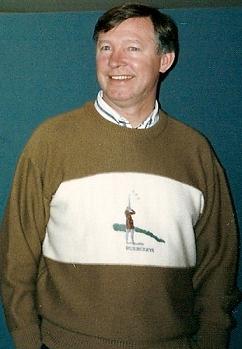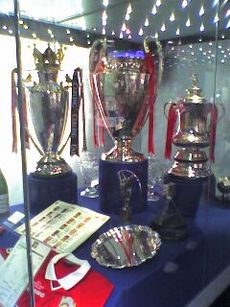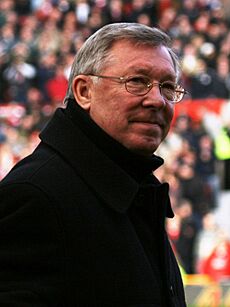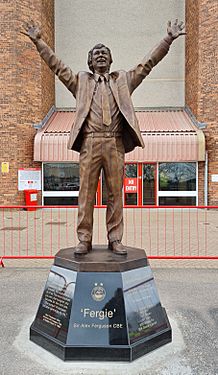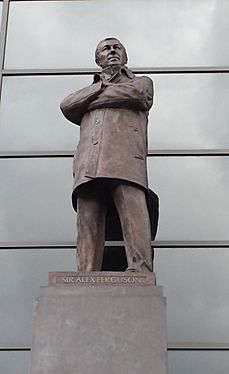Alex Ferguson facts for kids
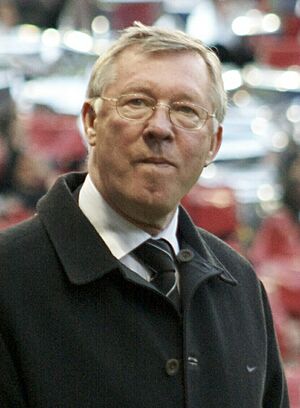
Ferguson in 2009
|
|||
| Personal information | |||
|---|---|---|---|
| Full name | Alexander Chapman Ferguson | ||
| Date of birth | 31 December 1941 | ||
| Place of birth | Glasgow, Scotland | ||
| Position(s) | Forward | ||
| Youth career | |||
| Harmony Row Boys Club | |||
| Drumchapel Amateurs | |||
| Senior career* | |||
| Years | Team | Apps | (Gls) |
| 1957–1960 | Queen's Park | 31 | (15) |
| 1960–1964 | St Johnstone | 37 | (19) |
| 1964–1967 | Dunfermline Athletic | 89 | (66) |
| 1967–1969 | Rangers | 41 | (25) |
| 1969–1973 | Falkirk | 95 | (37) |
| 1973–1974 | Ayr United | 24 | (9) |
| Total | 317 | (171) | |
| International career | |||
| 1960 | Scotland Amateurs | 1 | (1) |
| 1967 | Scotland | 4 | (3) |
| 1967 | Scottish Football League XI | 2 | (1) |
| Managerial career | |||
| 1974 | East Stirlingshire | ||
| 1974–1978 | St Mirren | ||
| 1978–1986 | Aberdeen | ||
| 1985–1986 | Scotland | ||
| 1986–2013 | Manchester United | ||
| *Club domestic league appearances and goals | |||
Sir Alexander Chapman Ferguson (born 31 December 1941) is a famous Scottish football manager and former player. He is best known for managing Manchester United from 1986 to 2013. Many people think he is one of the greatest managers ever. He won more trophies than any other manager in football history.
Ferguson was known for trusting young players. At Manchester United in the 1990s, he developed a group of players called the "Class of '92". These players helped make the club one of the most successful in the world.
Before becoming a manager, Ferguson played as a forward for Scottish clubs like Dunfermline Athletic and Rangers. He was the top goalscorer in the Scottish league in the 1965–66 season.
He started his managing career at Aberdeen, where he was very successful. He won three Scottish league titles, four Scottish Cups, and two European trophies. In 1986, he was appointed manager of Manchester United. In his 26 years there, he won 38 trophies, including 13 Premier League titles and two UEFA Champions League titles. He was knighted by the Queen in 1999 for his work in football.
Early life and playing career
Alexander Chapman Ferguson was born in Govan, a district of Glasgow, Scotland, on 31 December 1941. His father worked in the shipbuilding industry. He grew up with his parents and younger brother, Martin, who also became a footballer.
Ferguson's playing career started at Queen's Park when he was 16. He later played for St Johnstone and Dunfermline Athletic. At Dunfermline, he became a full-time professional footballer and was the top scorer in the Scottish league in the 1965–66 season with 31 goals.
He then joined Rangers for a record fee between two Scottish clubs. After two seasons, he moved to Falkirk and then to Ayr United, where he ended his playing career in 1974.
Managerial career
Early management jobs
In 1974, at age 32, Ferguson became the manager of East Stirlingshire. It was a part-time job, and he quickly became known for being a strict leader. Later that year, he moved to manage St Mirren. He transformed the team, taking them from a lower division to become First Division champions in 1977. The team was very young, with an average age of 19.
Success at Aberdeen
In 1978, Ferguson became the manager of Aberdeen. At the time, either Rangers or Celtic had won the Scottish league for 15 years. In the 1979–80 season, Ferguson led Aberdeen to win the league title. This was a huge achievement.
His players called him "Furious Fergie" because he was a very strict manager. He wanted his team to have a strong winning mentality. Under his leadership, Aberdeen won the Scottish Cup in 1982.
The team's greatest success came in the 1982–83 season. They won the European Cup Winners' Cup by beating the famous Spanish club Real Madrid 2–1 in the final. They also won the European Super Cup that year. Aberdeen continued to win trophies, including more league titles and Scottish Cups.
Manchester United: The beginning
On 6 November 1986, Ferguson was appointed manager of Manchester United. The club was struggling at the time, but Ferguson worked to improve the players' discipline and fitness. The team's performance got better, and they finished 11th in the league that season.
In the following seasons, Ferguson signed new players like Steve Bruce and Mark Hughes. The team improved but still could not win the league title. By 1990, some fans and journalists were calling for him to be sacked.
A victory in the FA Cup against Nottingham Forest is often seen as the match that saved his job. United went on to win the FA Cup that season, beating Crystal Palace in the final. This was Ferguson's first major trophy with the club.
Winning the Premier League
In 1991, United won the European Cup Winners' Cup, beating Barcelona. The next year, they won the League Cup. However, they still had not won the league title in 26 years.
The turning point came in the 1992–93 season with the signing of French striker Eric Cantona. With Cantona, United's fortunes changed. They won the first-ever Premier League title, finishing 10 points ahead of the second-place team.
The next season, United won the "Double" – both the Premier League and the FA Cup. This success continued, but the 1994-95 season was tougher. Cantona was banned for several months, and United finished second in the league and lost the FA Cup final.
The "Class of '92" and more success
In the summer of 1995, Ferguson sold some star players and promoted a group of talented young players from the club's academy. These players, including David Beckham, Paul Scholes, and Gary Neville, became known as "Fergie's Fledglings" or the "Class of '92".
Many people doubted that a team of young players could succeed. A TV expert famously said, "You can't win anything with kids." But Ferguson proved them wrong. United won the Premier League and FA Cup double again in the 1995–96 season.
United won the league again in 1997. They also reached the semi-finals of the UEFA Champions League, Europe's biggest club competition.
The Treble in 1999
The 1998–99 season was the most successful in Manchester United's history. The team won the Premier League, the FA Cup, and the UEFA Champions League. This amazing achievement is known as "the Treble."
The Champions League final against German team Bayern Munich was one of the most dramatic matches ever. United were losing 1–0 as the game went into injury time. They scored two goals in the final minutes to win 2–1. After the game, Ferguson said, "I can't believe it. Football, bloody hell."
Winning the Treble made Ferguson and his team legends. Over 500,000 fans came out to celebrate in the streets of Manchester.
Continued dominance in the 2000s
Under Ferguson, Manchester United continued to be one of the best teams in Europe. They won the Premier League again in 2000 and 2001, making it three titles in a row.
Ferguson signed many world-class players, including Dutch striker Ruud van Nistelrooy and English defender Rio Ferdinand. In 2003, he signed a young Portuguese winger named Cristiano Ronaldo, who would become one of the best players in the world.
In the mid-2000s, the team went through a period of rebuilding. They won the League Cup in 2006 and signed key players like Wayne Rooney, Nemanja Vidić, and Patrice Evra.
Second Champions League title
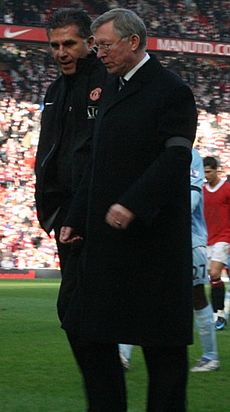
The team returned to the top of English football by winning the Premier League in the 2006–07 season. The following season, 2007–08, was even better.
United won the Premier League title again. They also reached the Champions League final, where they faced English rivals Chelsea. The match ended in a 1–1 draw and was decided by a penalty shootout. United won, giving Ferguson his second Champions League trophy.
In the following years, United won three more Premier League titles. By 2011, they had won the English league 19 times, more than any other club. In his final season, 2012–13, Ferguson led United to their 20th league title.
Retirement
On 8 May 2013, Ferguson announced he would retire at the end of the season. He had been Manchester United's manager for over 26 years and had managed them for 1,500 games. His final match was a thrilling 5–5 draw. After retiring, he became a director and ambassador for the club.
Legacy and personal life
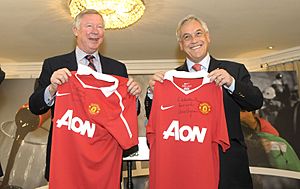
Ferguson's impact on football is huge. Many of his former players became managers themselves, including Steve Bruce, Roy Keane, and Ole Gunnar Solskjær.
A bronze statue of Ferguson was placed outside Old Trafford, Manchester United's stadium, in 2012. A nearby road was also renamed Sir Alex Ferguson Way in his honor.
Ferguson was married to his wife, Cathy, from 1966 until her death in 2023. They had three sons. One of his sons, Darren Ferguson, is also a football manager. In 2018, Ferguson had emergency surgery for a brain haemorrhage and made a full recovery.
- Statues of Sir Alex Ferguson
-
Statue of Sir Alex Ferguson at Pittodrie Stadium by Andy Edwards, unveiled 25 February 2022
Honours
Ferguson is one of the most decorated managers in football history.
Player
St Johnstone
- Scottish Division Two: 1962–63
Falkirk
- Scottish Division Two: 1969–70
Manager
St Mirren
- Scottish First Division: 1976–77
Aberdeen
- Scottish Premier Division (3): 1979–80, 1983–84, 1984–85
- Scottish Cup (4): 1981–82, 1982–83, 1983–84, 1985–86
- Scottish League Cup: 1985–86
- UEFA Cup Winners' Cup: 1982–83
- UEFA Super Cup: 1983
Manchester United
- Premier League (13): 1992–93, 1993–94, 1995–96, 1996–97, 1998–99, 1999–2000, 2000–01, 2002–03, 2006–07, 2007–08, 2008–09, 2010–11, 2012–13
- FA Cup (5): 1989–90, 1993–94, 1995–96, 1998–99, 2003–04
- League Cup (4): 1991–92, 2005–06, 2008–09, 2009–10
- FA Charity/Community Shield (10): 1990, 1993, 1994, 1996, 1997, 2003, 2007, 2008, 2010, 2011
- UEFA Champions League (2): 1998–99, 2007–08
- European Cup Winners' Cup: 1990–91
- European Super Cup: 1991
- Intercontinental Cup: 1999
- FIFA Club World Cup: 2008
Orders and special awards
- Officer of the Order of the British Empire (OBE): 1985
- Commander of the Order of the British Empire (CBE): 1995
- Knight Bachelor (Kt.): 1999
- Freedom of the City of Aberdeen (1999), Glasgow (1999), Manchester (2000), and Trafford (2013)
See also
 In Spanish: Alex Ferguson para niños
In Spanish: Alex Ferguson para niños
 | James B. Knighten |
 | Azellia White |
 | Willa Brown |


